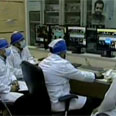
Think-tank: Israeli attack on Iran unlikely this year
Head of London-based Institute for Strategic Studies says only US capable of serious campaign against nuclear facilities; pre-emptive Israeli strike could backfire, he claims
An Israeli attack on Iran’s nuclear facilities would only set back Tehran’s program by a couple of years, the head of a respected London-based think-tank said Wednesday.
International Institute for Strategic Studies (IISS) head John Chipman said an Israeli attack against Iran was unlikely this year, following US assurances this week to Israel that it would not rule out military action.
Related articles:
- Op-ed: I don't trust Obama Jewish-Iranian author: Don't attack Iran
- 'Iran ready to wipe Israel off the map'
Only the United States could conduct a serious campaign against Iran’s nuclear facilities, he said.
Furthermore, a pre-emptive Israeli strike could backfire because it is likely to push the Tehran regime to accelerate its nuclear ambitions, warned the IISS director-general at the release of its annual “Military Balance” report.
Western powers suspect Iran is seeking to build a nuclear bomb, a charge denied by Tehran which says its atomic program is for purely civilian purposes.
“My judgment is that an Israeli attack on Iran of an overt kind is unlikely this year,” Chipman told a news conference on the annual assessment of the global military power balance.
“Both Israel and the United States are conscious that Israel can conduct a raid; only the United States can conduct a campaign.
“I think that it’s the latter that would be necessary in order to delay, in any meaningful way, the acquisition of a confirmed Iranian nuclear military capability.
“The judgment of most military experts is that any attack - whether a raid or a campaign - would only delay such acquisition and could, of course, incentivize the regime, once it reorganizes itself, to move ever quicker towards that goal.”
Chipman said that in talks this week in Washington, Israeli Prime Minister Benjamin Netanyahu received an assurance from US President Barack Obama.
The promise was “in effect, that if Israel took US advice and did not attack prematurely, that when the threat matured, the United States would, if all other options failed, use the military option.”
“So my judgment is that it is unlikely that there would be an attack this year.”
He added: “Washington has appealed for patience, on the grounds that Iran is not on the verge of producing nuclear weapons, that Israeli air strikes would set back Iran’s program by only a couple of years, and that sanctions are now having a real impact on Iran.”
Iran could carry out its threat to close the Strait of Hormuz by mining the key shipping channel and using anti-ship missiles, torpedoes or rockets, Chipman said.
“While these capabilities could disrupt shipping temporarily, the US and its allies maintain significant maritime assets in the region and would soon be able to reopen the strait,” he said.
Iran could also try to impose more bureaucracy on shipping, increasing transit times by imposing more demands on vessels using the waters it controls.
Chipman said tensions remained high in the Middle East, with regional states concerned about Iran’s nuclear and ballistic missile programs.
Gulf countries were continuing to buy a great deal of military equipment in response, he said.
- Receive Ynetnews updates directly to your desktop










